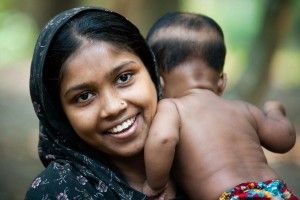
Many millions of the world’s most vulnerable children still risk dying before their fifth birthday, live without clean water and never go to school. The Third International Conference on Financing for Development in July presented a critical opportunity to address these inequities and established a blueprint for how the world will ensure the lives of these vulnerable children are improved over the coming 15 years.
Heads of state, donors, non-governmental organizations, corporate leaders, and ministers of finance, foreign affairs and development from governments around the world gathered in Addis Ababa, Ethiopia, for the conference, to deliberate ways to finance the Sustainable Development Goals (SDGs)—the agenda that will replace the Millennium Development Goals (MDGs) later this year.
Strides were made. Member states agreed on a global framework for development finance, The Addis Ababa Action Agenda, that strongly recognizes that investing in children is central to inclusive and sustainable growth, with an emphasis on equity and reaching the most vulnerable.
In broad terms, as the world determines how to improve the state of the world over the next 15 years, the SDGs are the “what”, this Action Agenda provides the “how”. And Canada—as an established global leader on child and maternal health and on accountability—continues to have a role to play to ensure the international community holds to and builds on the commitments made.
Canada’s leadership in saving children and mothers
Canada led efforts at the 2010 G8 Leaders Summit to launch the Muskoka Initiative to address child and maternal mortality, and co-chaired the global accountability commission to ensure that dollars pledged were given and results were monitored. Canada rallied again in 2014 with an additional commitment of $3.5 billion to save the lives of newborns, children and mothers. Canada was also one of the two countries to step up in September 2014 with pledges to the Global Financing Facility, a new initiative that will channel finances to accelerate efforts to end preventable deaths and strengthen national health systems.
As a champion for children, Canada must continue to leverage its influence within the global community to ensure that progress made is not lost and to ensure that the most vulnerable children and mothers who are currently left out of life-saving programs are central, not only in the SDGs, but also in the critical financing framework being set up to achieve them.
MDG hits, misses and learnings
The past 15 years of development, guided by the MDGs made huge strides—cutting child mortality rates in half and proving that a child survival revolution is within our reach with targeted funding and political will.
However, the MDGs failed to reach many of the world’s most vulnerable and marginalized children. Often the disadvantages and disparities they face were hidden by national averages showing progress only experienced by some segments of society. High-quality, timely and credible data are critical to developing and implementing policies that can improve the lives and futures of these vulnerable children. Data must dig down to the local level to respond to unique challenges, so global efforts aren’t just boosting national averages, but reaching all children.
The last 15 years also has taught us that disadvantage and inequality in opportunity are not inevitable. Experience has shown that building a more peaceful, prosperous and sustainable world starts with smart investment in children – especially the most vulnerable.
The international community must build on the commitments made in Addis Ababa by:
We know that investing in children makes economic sense:
The Addis Ababa gathering was an historic event. The commitments outlined in the Addis Ababa Action Agenda will guide efforts to build a better world. Those efforts must start with smart investment in children, particularly, the most disadvantaged, so that every child has an equal chance to survive, thrive and contribute to the peace and prosperity of the world.
More and smarter investment in children, especially the most marginalized, must be at the core of the financing decisions made as we look to the next 15 years. Without targeted investment in children, the survival, growth and futures of individual children will be at stake. But so, too, will the prosperity and security of the future itself.
We challenge Canada and the international community to turn the promises made to invest in children and young people into concrete action that reduces inequities and provides every child with a fair chance in life.
David Morley, President and CEO of UNICEF Canada, represented the Canadian Network for Maternal, Newborn and Child Health as part of Canada’s official delegation at the Finance for Development Conference in Addis Ababa, Ethiopia from July 13-16.